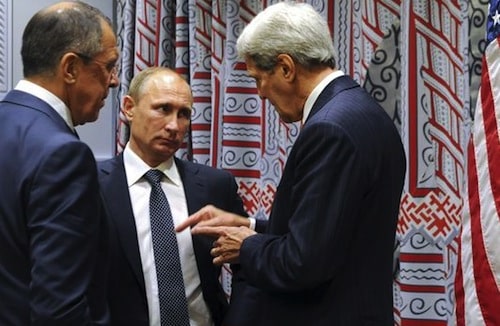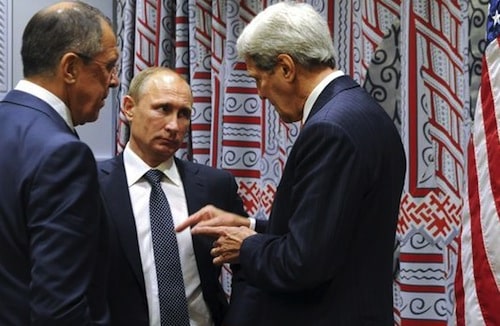
It is a good sign that John Kerry visited Moscow and had high-level meetings, but we must remember that US foreign policy will not change on a dime, said Daniel McAdams, Executive Director of the Ron Paul Institute for Peace and Prosperity.
RT: Washington appears to be backing away from previous calls to isolate Russia… What is behind the apparent change in policy?
Daniel McAdams: I think, first of all, diplomacy is always good. It is a very good sign that John Kerry actually went to Moscow, made the effort to go out there and had these high-level meetings. I think it is something very positive. However, I don’t want to get ahead of ourselves here because policy doesn’t change on a dime. But what is the reason for this apparent shift, I think the facts on the grounds have changed in places like – particularly – Syria.
Russia was very assertive several months ago and they literally changed the situation. The US was not counting on Russia being so assertive. They were well into the stages of planning a ‘no-fly zone’ which would have been a hub for the US-preferred rebels to operate from to continue the US policy – which has not abated – of overthrowing the government of Assad. The Russian move into Syria, based on a bilateral agreement with the Syrian government, has changed the facts on the ground. The aggressive American rhetoric, along with control of the skies and the ground in Syria, ended, and I think Washington took a long time to find its feet. And I think now they might be trying to attract some flies with honey instead of vinegar, as we say here.
RT: How could this affect the US relationship with its allies who oppose Russia, notably Ukraine and Turkey?
DM: There are two schools of thought on what happened with Turkey and the shoot down of the Su-24.One would say that there is no way Turkey would take such a bold move without Washington’s approval and maybe encouragement. The other says that Washington freaked out when Turkey did something so bold and so completely insane and destabilizing. What is the truth, I don’t know, I am not privy to that information. But I would say we shouldn’t get too far ahead of ourselves and think the US is going to abandon Turkey or abandon their grand project in Ukraine, which the head of the National Endowment for Democracy called “the prize”. Let’s not forget that.
Let’s also not forget that Kerry was traveling, although, of course, it’s a mere formality, but he was traveling with Victoria Nuland, one of the strongest Russophobic people in the US government, with Celeste Wallander, who said “Today’s Russia is not the Russia we want,” just a couple of months ago. These people have built a career on an anti-Russian philosophy. If we saw some moves in the US government to isolate some of these people and perhaps replace a few, I might be a little more sanguine about the trip, but I am cautiously optimistic, I would say, overall.
RT: What are the chances of a broader coalition, including the US and Russia, against Islamic State?
DM: I am not sure that’s such a great idea from the US perspective. I think the best US policy in the Middle East is non-intervention, stay out of the affairs, stop trying to decide what the future of the Syrian government should be. The US still has an official policy of regime change, that hasn’t change. Now they are calling it a political transition but we are not stupid, we know what it means. The US has spent the last two years demonizing Russia. It is too early to say that they flipped on a dime. If Russia and Syria agree that they have a relationship that Russia can assist the legitimate Syrian government that is one thing. But for the US to get involved, I think, it is still very dangerous; the best policy for the US is non-intervention.
Reprinted with permission from RT.

